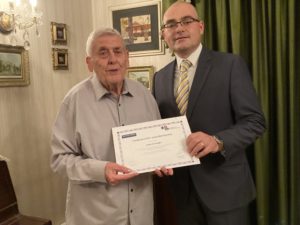“Coming home is seldom easy. The doors of perception fit differently,and there is always the danger that someone will think that you have grown as much as they were afraid that you would, or that you have become an enemy within.”
Eric Willian: “People” (1972)
Can one describe the Institute of Financial Services in Malta this year, in its 60th Anniversary, as “coming home”? The salient events in the life of this leading professional institution in the country could provide a stimulating answer: as to “coming home” …. isn’t that where the heart beats?
When, in 1979 in London, Edwin Green wrote the history of the Institute of Bankers, on the occasion of the Centenary of that august body, he had no hesitation in pronouncing and considering the many great personalities who had given a lifetime to the maturing and growth of the Institute, as being “Debtors to their Profession”. [1] The example of those pioneers’ dedication and integrity has been imitated worldwide. And Malta is no exception in considering as exemplary the inspiration and hard work of some of its citizens for the growth and development of its own banking profession. Green’s description may therefore be easily reversed to consider this as a record of “a profession which is indebted to them”.
It is not an attempt at writing economic history, or being sentimental, or the complete history of banking education in Malta, it is more in the nature of a family album which, hopefully, will give pleasure and satisfaction to all those who, and they are many, who have been connected with banking in these islands.
The logical locus of the (as it was first named) the Malta Centre of The Institute of Bankers in our national banking history would seem to lie in a link with that period between 1949 and the middle Sixties, when banking expanded out into the towns and villages, and an influx of many young men and women to fill the new posts created took place. That much is fact on a collective basis. On an individual basis there seems to be a somewhat different story. It is one which was related by Lous E. Galea F.I.B. (the historic “father” of Maltese banking) in an article he wrote for the Times of Malta’s special supplement in 1979 commemorating the Centre’s 18th Anniversary. It deserves faithful quote”:
“:Contact from Malta with the Institute of Bakers in London was first made in the mid-thirties by an employee of Barclays Bank. He had been with the bank for a couple of years, and he soon became disgruntled with the drudgery of his duties. So he decided to find what was the position of the bank employee in England particularly from an educational point of view. Following correspondence with the Institute of Bankers in London, it transpired that the opportunity to qualify in banking was open even to non-residents in England. He took his examinations and by the end of the War he was the first to qualify in Malta for a Banking Diploma of the Institute.”
My research in the Institute’s archives at the then 10, Lombard Street, EC3 Institute headquarters in London did not provide mention of this gentleman – a certain Joe Bonnici – and it is not improbable that, equipped as he now was with an internationally recognized professional qualification, he could have moved on to pastures other than banking. Louis Galea himself later took the Institue’s exams and was, most possibly, the first Maltese to qualify after Bonnici. He was also the first Maltese to be awarded Fellowship of the Institute for his work both for the Institute and banking in Malta.
But these were, up to then, only developments on an individual basis. It was around 1959 that meetings of Maltese bank employees started being held here to set up a Malta Institute of Bank Officials (MIBO). All Minutes of meetings of that body between the 28th September 1959 and 14th April 1961 appear signed by the then Secretary Francis R. Flynn, and MIBO’s founding AGM was held on the 4th November 1960. But much suggests that that purely locally based body was conceived as a precursor of what was to follow it, the actual creation locally of a branch of what was of course the more endowed and internationally reputed Institute of Bankers, headquartered In the City of London.
On November 8th 1961 the first General Meeting of The Institute of Bankers (Malta Centre) was held at the Malta Chamber of Commerce. It was followed by an auspicious reception at the same Chamber on December 16th 1961, and all the country’s leading personalities (Governor, Archbishop, ministers, etc) were present for the event. It was one of great pride for Malta’s banking community: but actually we had been beaten to the post by other local centres of “the Institute” created earlier in Singapore and Nairobi. The still existing first Minutes Book of the Local Centre covers the years between 8th November 1961 and 6th September 1971.
From then on the story of this professional body is one of constant moving forward through serene, and much less so, times. The country had no formal banking education courses, and those at the University of Malta only appeared later when Rector Prof. Peter Serracino Inglott correctly read the signs of the times for a fledgling financial services industry and set up a Department of Banking and Finance in the mid-1990s. That department has now gone to well over its quarter-century. The Institute’s qualifications soon became a must-follow-for-promotion requirement within the then existing local banks, and its courses naturally attracted large following.
But that too was a chronicle with thorns: the leadership of the Local Centre (vide box) had to go through fire and hell in 1978 and 1979 to obtain the local Ministry of Education’s permit (in terms of a then new local education Act) to continue to provide their professional courses. The late Lino Spiteri, then Deputy Governor of the Central Bank of Malta, had strongly chided then Education Minister Philip Muscat for delaying the giving to the Institute the necessary permit to continue doing the good that it was factually already doing. Also, in 1978, the Malta Local Centre, like other bodies in Malta, had to “apply for permission” for the simple and natural right of using the word “Malta” in its own name.
But a year later in 1979 in London the Institute celebrated its Centenary, and the high esteem which the Malta Centre enjoyed was reflected in the VIP treatment given to the Malta Centre’s delegation to those festivities. Those leaders came back ever more eager to continue with the many activities that had become a constant character of this body: seminars, industrial visits, an annual dinner which over time became the major financial policy speech venue in the country for the governor of the CBM, monthly public lectures, publications, and, above all, a constant striving for serious professionalism in all that both the organization and its members did daily in their work.[2]
The content and structures of the Institute’s courses, diplomas, and degrees evolved substantially over time. Maltese members participated in the Institute’s first European Banking Study Tour, in the International Banking Summer School, won the Clegg Prize in 1980 (J.C.Aquilina), at least three Maltese placed first in the world in the Institute’s exams (Tony Vella, James Bonello, and Joe E. Agius), and obtained many other professional recognitions. Another, different, important recognition was when the world’s first female astronaut Russia’s Valentina Nikolaeva Tereshkova visited the Institute’s new premises in Gwardamangia, then secured with the great help of former Finance Minister George Bonello Du Puis)
As the old Latin saying goes, time changes and we do so similarly in it. The Institute’s archives show that during 1981 and 1982 correspondence was exchanged with the then existing Kenya Institute of Bankers to learn more about the background that had ensued in that Centre becoming a formally insdependent body and not a branch of London as such. Indeed it is a chronicle in itself to follow the changes for this leading professional education body: e.g. from first an Institute of Bankers with Local Centres around the world, to then a 1987 change to The Chartered Institute of Bankers, and then the 2001 change to The Institute for Financial Services Malta. Nobody can really say what will follow into the future as, indeed, non-institutional banking services banks come to ever more play a life in several financial markets.
As, over the years, the structure, the objectives, and even the actual name of this body had to change in line with the realities of the profession, the enthusiasm and dedication to work hard for constant advancement of financial education and professionalism has never waned. When first born in Malta it set out a trend that soon imbued other local professions: the accountants, the lawyers, the engineers, and others created similar bodies, and this has all been a very valid contribution to the country’s constant move up in professionalism.
Happy birthday Institute of Bankers and ad multos annos.
[1] The expression had first been used by Francis Bacon in 1630 in “The Elements of the Common Laws of England”.
[2] See, for example, Speech by the President of the Malta Centre as reported in The Times, Thurs June 20th 1985.
 Dr. John Consiglio is the author of “The History of Banking in Malta” (Progress Press, 2006), a former bank executive for 42 years, and academic at the Department of Banking and Finance of the University of Malta.
Dr. John Consiglio is the author of “The History of Banking in Malta” (Progress Press, 2006), a former bank executive for 42 years, and academic at the Department of Banking and Finance of the University of Malta.
The Professional Banker Certificate and Diploma is an introductory qualification for individuals working in retail, business and private banking environments.
The main objective of this training course is to provide a solid background of the local regulatory framework.
A practical, introductory-level course that will give you a solid understanding of core compliance issues.
Combating Financial Crime, developed in collaboration with QCo, provides a global view of transnational crime.

Ifs Malta will be holding its Graduation Ceremony in May 2024. Students who completed their courses successfully will receive a formal electronic invitation closer to the date.
Stay updated with our latest news, course announcements and events. We take your privacy seriously and promise not to share your email with any third parties.